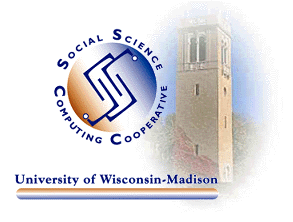
New Linux Compute Cluster
MailSpinner to be Removed on Monday
Telnet to be Disabled in January
SSCC Fall Training Schedule
Turn Off Those Computers/Monitors before Leaving
A Reminder about Where to Save Files when Using Terminal Server
We announced SSCC's new Linux compute cluster for running large STATA, SAS, R, Fortran, and C/C++ programs at the Town Meeting earlier this week. This cluster has a powerful batch pooling utility installed called Condor which was developed at UW-Madison's Computer Science Department. Besides being a powerful batch management and scheduling utility, Condor also provides high throughput by amassing the collective CPU cycles from the Linux computers in SSCC's new cluster as well as available CPUs from other Condor clusters (known as flocks) on campus and even around the world. If successful, Intel based Linux computers may eventually replace the Alpha based Tru-64 Unix computers at SSCC.
Below are links to more information:
We will be removing MailSpinner on Monday, October 8. Recall that SSCC installed SquirrelMail in August to replace MailSpinner, a web-based e-mail program that is being discontinued by the company that produces it.
SquirrelMail, is freeware and has many features that MailSpinner doesn't. This new program can capture e-mail addresses and store them in an address book. It allows you to set up filters to perform some actions automatically. SquirrelMail also handles multiple folders and creating new folders quite effectively, and allows you to customize your interface.
Like MailSpinner, SquirrelMail will allow you to log in and read your mail from anywhere in the world, on the web. It uses the IMAP protocol, so all of your IMAP mailboxes will be available to you. You can get to this mail program at https://webmail.ssc.wisc.edu.
Since SquirrelMail is an IMAP client, it will automatically recognize the folders you normally use with your Eudora, Pine, Netscape, Outlook, or Outlook Express IMAP client programs. If you still access a POP server, either ours or DoIT's, your folders are on your private PCs and are not accessible to SquirrelMail. SquirrelMail has an online help system but don't hesitate to contact Consultant if you need assistance.
Beginning Wednesday, January 2, 2002, SSCC will be disabling external telnet access to SSCC UNIX computers. Telnet is a clear-text protocol, which means any data that is passed along the data stream is unencrypted (including passwords). This allows any malicious person who can intercept ("sniff") the data access to a user's password, and therefore access to their account. We are replacing telnet with a protocol called SSH. SSH is completely encrypted, so anyone sniffing the data stream will only see garbage.
DoIT provides a PC SSH client as part of Wiscworld called SecureCRT. This software can be downloaded from DoIT's web page. A word of caution, you must specify SSH as the connection protocol when you set up your new sessions within SecureCRT. Otherwise, it uses the telnet protocol. Note that DoIT's download web page is only accessible from UW network (IP) addresses. If you happen to be traveling, or get your Internet service from some other source than the UW, we recommend a freeware PC SSH client called PuTTY.
There is also a Mac SSH client included in Wiscworld called NiftyTelnet. It is free, and can be downloaded from the above link no matter where you are.
Telnet access from the local network (which consists mostly of computers in the Social Science building) will still be allowed, because both the older NCD X-terminals and the newer Winterms only have Telnet clients, and can't provide SSH connectivity.
SSCC will be writing a publication that explains installing and using these programs in more detail before this change goes into effect. This is the first step in an effort by SSCC to replace clear-text protocols with secure, encrypted equivalents. Other changes will occur as PC client software becomes widely available and stable.
The Wisconsin Division of Energy has asked campus IT staff to remind computer users to take two simple steps to save energy at the workplace:
About half of computer users do not take these steps. The U.S. EPA has developed
fact sheets and software on this subject, available on-line.
WinCenter and WinStat users: This is a reminder that you should save your files in your NT home directories or NT project directories (if you have one). Files should never be stored on the C: drive as they will inevitably be removed. We also continue to highly recommend that you do not store files on your UNIX home directory from WinCenter or WinStat. We have experienced intermittent problems where these files get corrupted. For details about this problem, read the September 1999 issue of SSCC News.
Go to previous editions of
SSCC News .
Go to the SSCC Home Page.
© 2001 University of Wisconsin Social Science Computing Cooperative